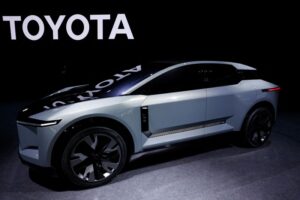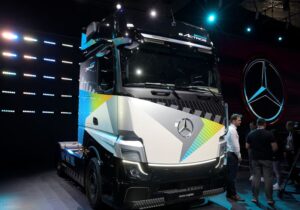Stellantis CEO Struggles to Sell Jeeps in the Golden Era of SUVs


(Bloomberg) — After years of earning envy-inducing profits by way of relentless frugality, Stellantis NV’s Carlos Tavares cut too deep.
Most Read from Bloomberg
The owner of the quintessential sport utility vehicle brand is having trouble selling Jeeps at a time when SUV demand has never been better. Its Ram pickup division has swiftly gone from challenging General Motors Co.’s Chevrolet to sliding in the sales rankings. The only model Chrysler is still producing is a minivan.
A relatively bare cupboard caught up with Stellantis in the first half of the year, culminating in a disastrous set of earnings results this week. At least seven senior executives have left the company since January, and its stock has plunged 40% from a record high reached in March.
The setbacks have come thick and fast for Tavares, 65, who only three months ago won shareholders’ blessing for a €36.5 million ($39.7 million) compensation package that made him the highest-paid CEO of a traditional car manufacturer. His emphasis on trying to protect profit margin left Stellantis charging higher prices for older products than what rivals had on the market, leading to lost share and elevated inventory.
“The descent is starting and Tavares has his back against the wall,” said Pierre-Olivier Essig, a London-based equities analyst at AIR Capital. “The cost cutting is exhausted and there isn’t enough innovation.”
Tavares — a protégé of the spendthrift former CEO of Renault and Nissan, Carlos Ghosn — has been CEO of Stellantis since its formation in early 2021 from the merger of Italian-American manufacturer Fiat Chrysler and France’s PSA Group. While he noted Stellantis’ returns are holding up better than its rivals, Tavares also acknowledged that first-half results fell short of the company’s expectations and vowed corrective action.
Stellantis cut prices on the Jeep Compass and Grand Cherokee SUVs earlier this year and added more content to its vehicles to adjust to the higher interest rate environment. While Jeep’s US sales plunged 19% in the second quarter, the brand will soon have two new electric models to sell: a Wrangler lookalike called the Recon, and the 600 horsepower Wagoneer S.
Jeep will also bring back the Cherokee, which went out of production last year and left the brand less competitive in the largest segment of the SUV market. Stellantis’ losses has been Ford Motor Co.’s gain — the maker of the Explorer, Escape and Bronco sold more than 400,000 blue oval-badged SUVs in the first half, a record.
“Product mix and pricing are the two big challenges they have,” Erin Keating, an executive analyst at market researcher Cox Automotive, said of Stellantis.
From 2019 to spring of 2024, the automaker raised prices for its top two brands — Jeep and Ram — by about 50% and 40%, respectively, according to Cox data. That compares with an industry average of about 25% during that span, when manufacturers jacked up what they charged for new vehicles in part because of post-pandemic supply chain issues.
“That’s significant,” Keating said of raising prices by almost double the amount that competitors did. “That’s a problem.”
Like Jeep, Ram lost significant ground in the first half, with US sales of the brand’s all-important pickups declining 20% from a year ago.
Ford’s F-Series deliveries also fell, though by just 8%, while GM increased sales of the Chevy Silverado and GMC Sierra.
Wall Street keeps a close eye on how pickup sales are trending because big trucks are still Detroit carmakers’ profit engine. Ford’s F-Series has been the top-selling vehicle line in the US since the Reagan administration, and the company has boasted that the product line brings in money at rates rivaling Coke, McDonald’s, Nike and Starbucks.
Jeep and Ram’s challenges have coincided with a particular amount of churn within Stellantis’ North American executive ranks.
Mark Stewart, the chief operating officer for the region, left the company in January to become the CEO of Goodyear Tire & Rubber Co. Timothy Kuniskis and Jim Morrison, two long-time executives at Jeep and Ram, retired within weeks of one another.
And Jason Stoicevich, who worked for Stellantis and its predecessors for more than 20 years, resigned after two months in a newly created role of senior vice president of US retail sales.
In addition to bringing back the Jeep Cherokee, Stellantis will revive two Dodge muscle cars — the Charger and Challenger — that the company stopped producing last year. In the interim, it will pare back production in the US and consider more drastic changes.
“There is absolutely no taboo” with respect to the future of the companies’ 14 brands, Tavares told Bloomberg Televsion in an interview Thursday. “If they are not able to monetize the value that they represent, then decisions will come.”
Chrysler, which turns 100 next year, isn’t the only division of the company facing an uncertain future. Just as the Detroit brand is down to making only the Pacific minivan, the Italian marque Lancia has just one model currently — the Ypsilon — which is virtually the same car as the Peugeot 208.
“Especially with fairly authentic brands like Lancia, history suggests that the consumer does not react well to that re-badging,” said Harald Hendrikse, a Citigroup analyst who has the equivalent of a hold rating on Stellantis shares. “They’re not the most innovative products.”
In addressing a question from Bloomberg TV about whether Stellantis is committed to all of its brands, Tavares pointed out that the company was not alone this week in reporting earnings that weren’t well-received by the market.
“The transition that we are going through is immensely challenging,” Tavares said, referring to the broader auto industry. “This is a bump. There will be other bumps. This will last for a few years — this is not a short-term turmoil — and the most resilient, the most focused, the most customer-focused, will survive.”
–With assistance from Stefan Nicola, Craig Trudell, Jonathan Ferro, Lisa Abramowicz and Annmarie Hordern.
Most Read from Bloomberg Businessweek
©2024 Bloomberg L.P.








